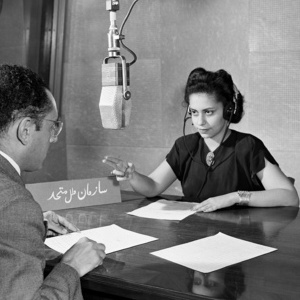Fearless, Vital, Warm & Extraordinary
Pic left:Leila Doss and Abdollah Faryar at the United Nations Radio Division, New York 1950. UN Photo.
The IAWRT is saddened by the death of Leila Doss, a ground breaking media woman credited with being the first female broadcaster in Egypt, and the first female to work as a United Nations Assistant Secretary General.
It is a measure of Leila Doss’s principles that she walked out on both jobs “The day I can’t do an honest job” she told the 2005 IAWRT Biennial, “I resign.”
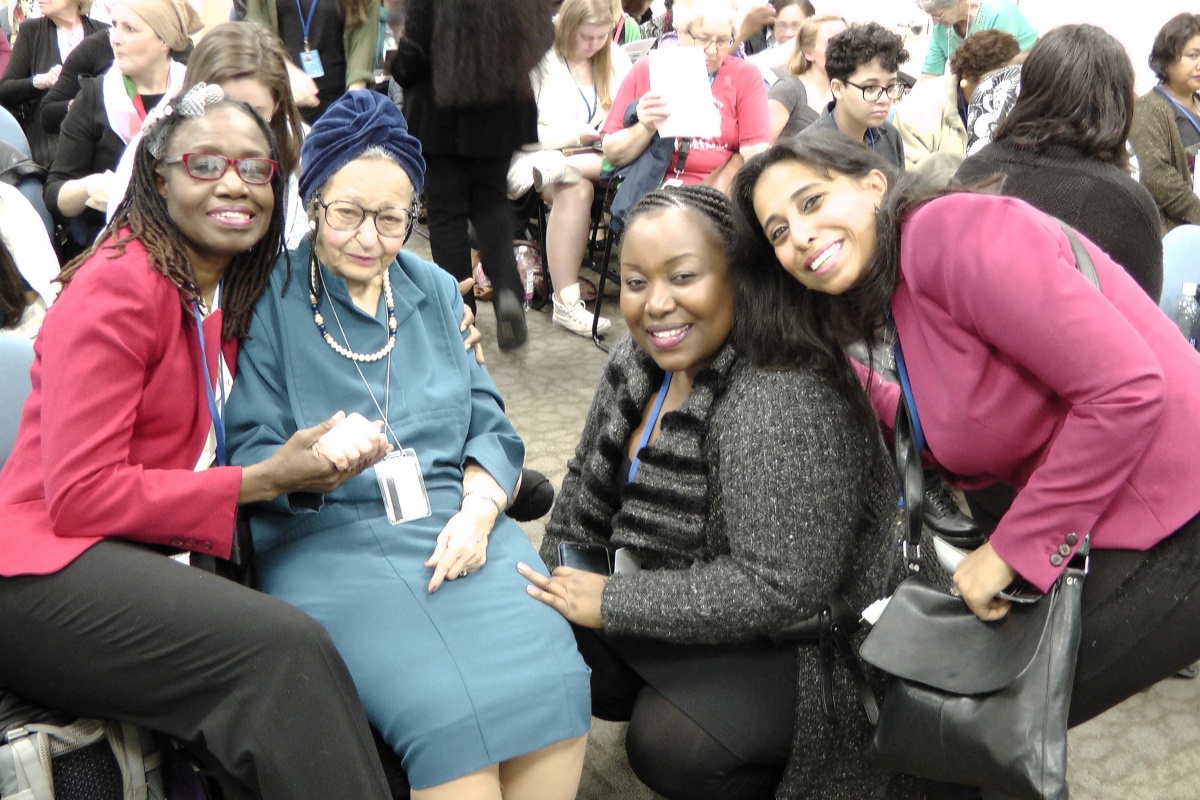 Leila was one of IAWRT’s longest serving members, a board member of the USA chapter, and was still actively participating in UN projects and the IAWRT at the age of 95. Despite her frailty, she attended the IAWRT event, Exploring strategies to eliminate gender inequality in the media, held in parallel with the 60th Commission on the Status of Women in New York, March 2016. However, two months later she was hospitalised by a long-term illness and died in July.Pic right: L-R Sheila Dallas-Katzman, Leila Doss, Voilet Gonda, Abeer Saady, New York, March 2016.
Leila was one of IAWRT’s longest serving members, a board member of the USA chapter, and was still actively participating in UN projects and the IAWRT at the age of 95. Despite her frailty, she attended the IAWRT event, Exploring strategies to eliminate gender inequality in the media, held in parallel with the 60th Commission on the Status of Women in New York, March 2016. However, two months later she was hospitalised by a long-term illness and died in July.Pic right: L-R Sheila Dallas-Katzman, Leila Doss, Voilet Gonda, Abeer Saady, New York, March 2016.
IAWRT USA chapter head, Sheila Dallas-Katzman writes; Lelia Doss was a champion of women and children’s rights and a philanthropist whose generosity knew no boundary. IAWRT-USA and Internationally, will miss her. May her soul rest in everlasting peace.
Now we must fly on our own wings – Gunilla Ivarsson, IAWRT President
It was with great sadness I received the message that this impressive and amazing woman is no longer with us. Despite her serious health problems she assisted actively in the preparations of the IAWRT CSW activities in March this year. She was on the front seat during our panel session and she took an active part in the rather lively gathering afterwards with the IAWRT International Board and the US Chapter.
IAWRT has many mature and very experienced members still active, but personally I feel that we have now lost one of the eldest and most important links into the UN. Now we must fly on our own wings – but thanks to Leila and others, we are prepared.
Leila Doss was born in Egypt in 1921
Allied forces have landed in Normandy
Leila said she became first woman radio broadcaster in Egypt by chance. Her media career began as a radio producer. In June 1944, she made a spectacular debut, announcing the invasion which ended World War Two.
“It was the landing in Normandy, and they [Egyptian State Radio] were stuck, because there was nobody there at that hour of the day … to announce it. So they shoved me into a studio, put the microphone in front of me and said ‘start taking’ and I never stopped talking after that.”
Leila started managing the English programming for Egyptian State Radio, which was then run by the British Marconi company. However, the second time Leila was asked to train an inexperienced Englishwoman to be her boss, she had had enough. Leila recalled that she was told she could continue in the job but not have the title or the salary “because we cannot give such a responsible job to an Egyptian:
“I turned tail and walked out of the building.”
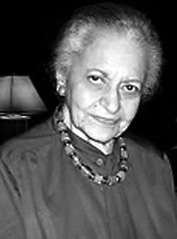 On her world travels, she visited the United Nations in New York, and it became her home. After watching a debate on the Suez crisis, Leila asked for a job. She joined the newly formed Radio Division of the UN in 1947. She loved the call sign: “Saying ‘This is the United Nations calling the peoples of the world’ was one of the most wonderful feelings you can have” she recalled.
On her world travels, she visited the United Nations in New York, and it became her home. After watching a debate on the Suez crisis, Leila asked for a job. She joined the newly formed Radio Division of the UN in 1947. She loved the call sign: “Saying ‘This is the United Nations calling the peoples of the world’ was one of the most wonderful feelings you can have” she recalled.
No adjectives or adverbs
However, broadcasting UN news was not easy, pressures were exerted by member countries which transmitted broadcasts, and the rules were stultifying: “We were not allowed to use adjectives or adverbs … it was like walking a tightrope with your hands tied behind your back” Leila said.
Later Leila worked in information centres in New York Geneva, Bangkok, Cairo, and Rangoon as a media officer, radio officer, a director of the UN Division of Economic and Social Information, and head of the information campaign for the International Year of the Child.
Leila weathered controversies, and the pressures of member countries and other UN officials and the threat of sacking until her appointment as Assistant Secretary-General for personnel services, brought it all to a head. “It was the most frustrating and horrible job in my 37 years of my UN career”. She finally felt it was no longer possible to do “an honest job” and retired in 1982. Her assessment two decades later was: “The UN is still a work in progress”
Leila remained in New York, active as a lecturer in media and international affairs, wrote poetry and headed “The World at the UN,” a field study program at Fordham University, and participating in IAWRT.
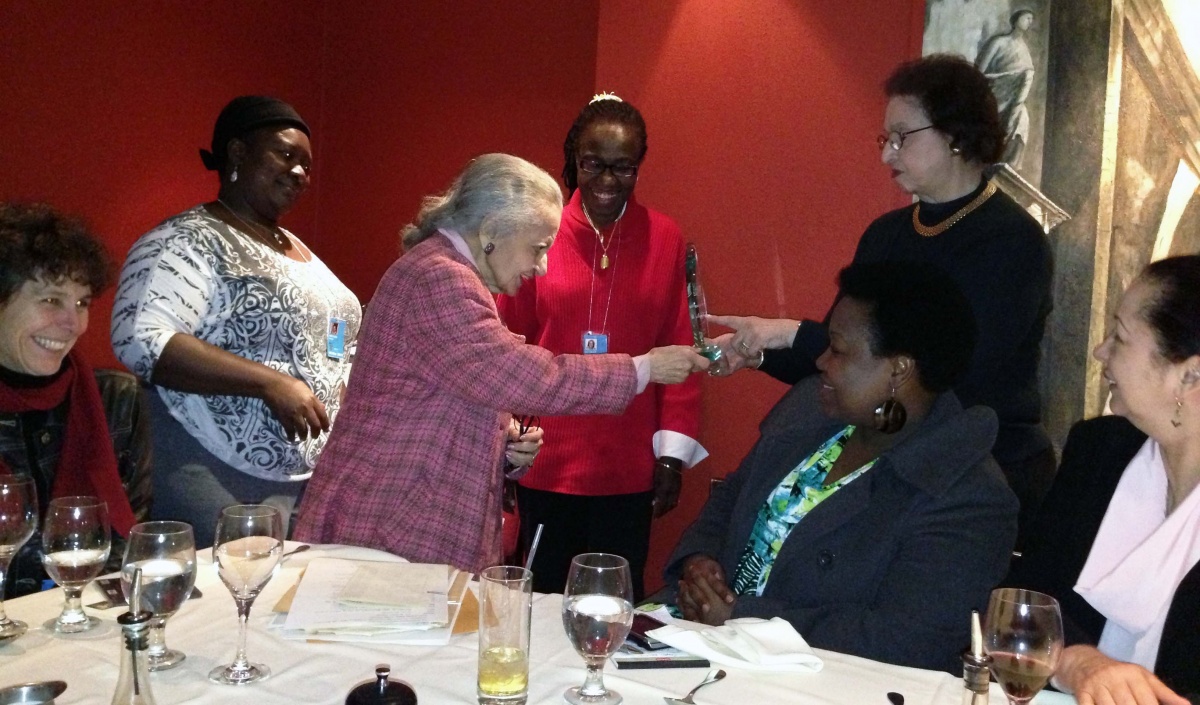
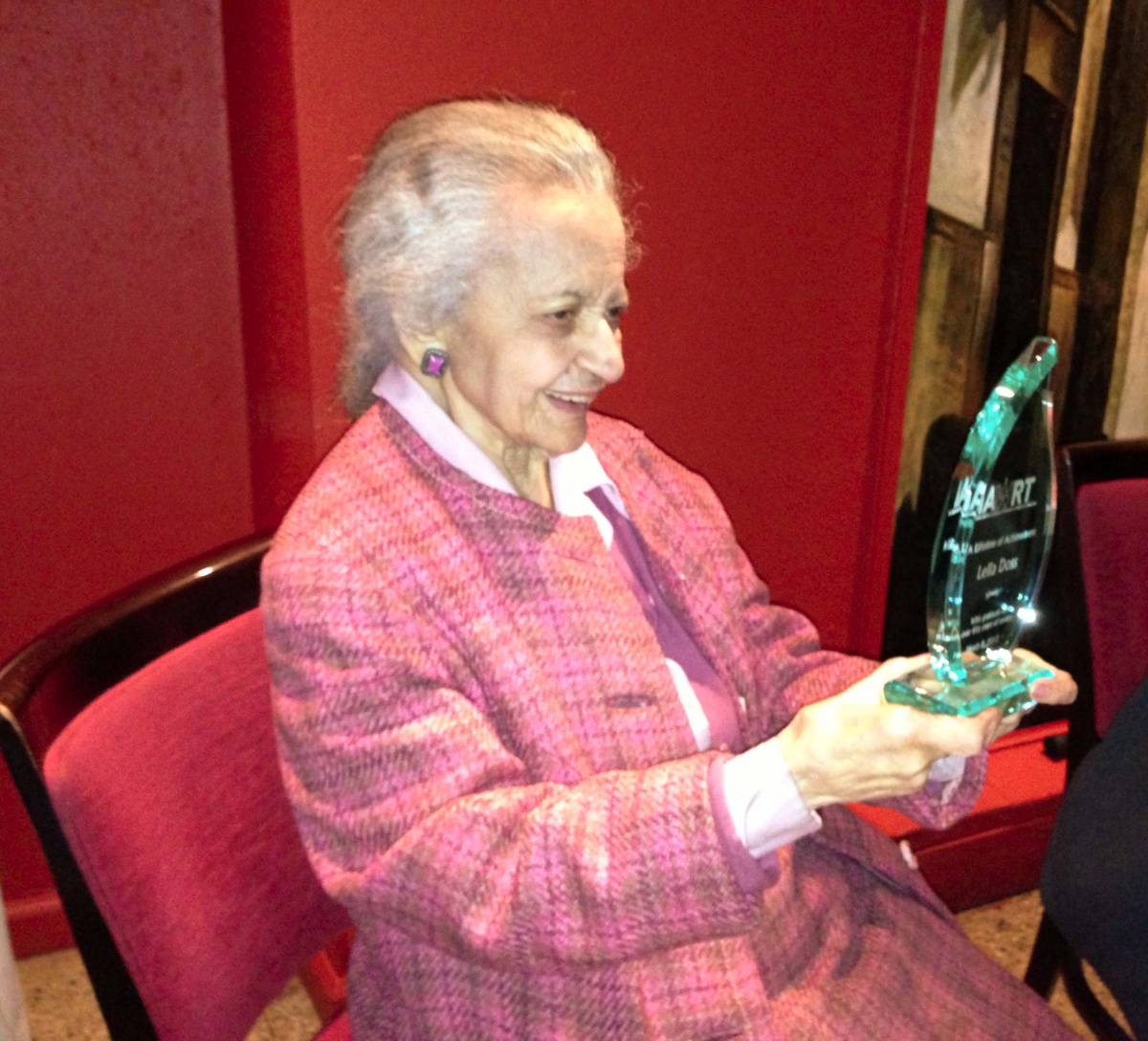 In 2013, Leila was presented with an IAWRT lifetime achievement award for 50 years of service pics:Gerd Inger Polden:Catherine White presents the award (L-R) Liz Miller, then President Rachael Nakitare, Sheila Dallas-Katzman,Violet Gonda. (Video here).
In 2013, Leila was presented with an IAWRT lifetime achievement award for 50 years of service pics:Gerd Inger Polden:Catherine White presents the award (L-R) Liz Miller, then President Rachael Nakitare, Sheila Dallas-Katzman,Violet Gonda. (Video here).
Her career and commitment to women and humanitarianism are only a partial tribute to Leila Doss. She made a particularly great impression on those who met her when the 2005 Biennial was held in the USA. She lives on in the hearts and memories of IAWRT members who knew her.
Gundel Krauss Dahl: She gave of herself to the very last
Gundel (IAWRT President 1997–2001) writes; Alas, Leila has left us – and with her one of the most impressive personalities in the IAWRT family is no longer amongst us. Leila represented a bridge from the earliest beginnings of our organization up to the very present. The fact that she was so actively engaged and committed and gave of herself to the very last has my deep admiration and respect. I met her in person only once, in Williamsburg in 2005, but I have never forgotten that small, gracious and energetic woman who personally took the initiative to give the visitors from Iraq the space and platform they deserved. That story has been mentioned by others.
Leila was a person who radiated warmth, and she generously shared her immense knowledge and experience across countries and cultures. She has truly earned our love and gratitude. Thank you Leila for being with us all the way.
Racheal Nakitare:She inspired me
Rachael (IAWRT President 2011-2015) says; No amount of words could really express the loss we feel at personal as well as professional level. Leila was in a class of her own. She inspired me with her gracious demeanors and attention to detail. I will miss you dearly Leila Doss. R.I.P
Violet Gonda: I mourn the loss of a mentor and one of my dearest friends
I can’t believe that we are talking about Leila in the past tense. Leila was full of life and I could not believe the amount of energy she had even at 95. She didn’t want people to fuss around her. She loved to cook for her guests or just take groups out to her favourite restaurants in New York.
Because of Leila I got to know more about the culture of New York and the workings of the UN. She welcomed me in her house every time I was in New York and we would spend hours and hours talking. She had such great stories about her time at the United Nations and her travels. When she lived in Thailand or Geneva and the people she met. Leila had the unique position of having worked for the UN from around the time it started and therefore knew almost every Secretary General.
I learnt a lot from Leila and I thank God for the time spent, memories shared and new friends she introduced me to. She was a caring person and I saw first hand the love and help she gave to our dear friend the late Diane Bailey. Even though Leila herself was ill, she was more concerned about other people than herself.
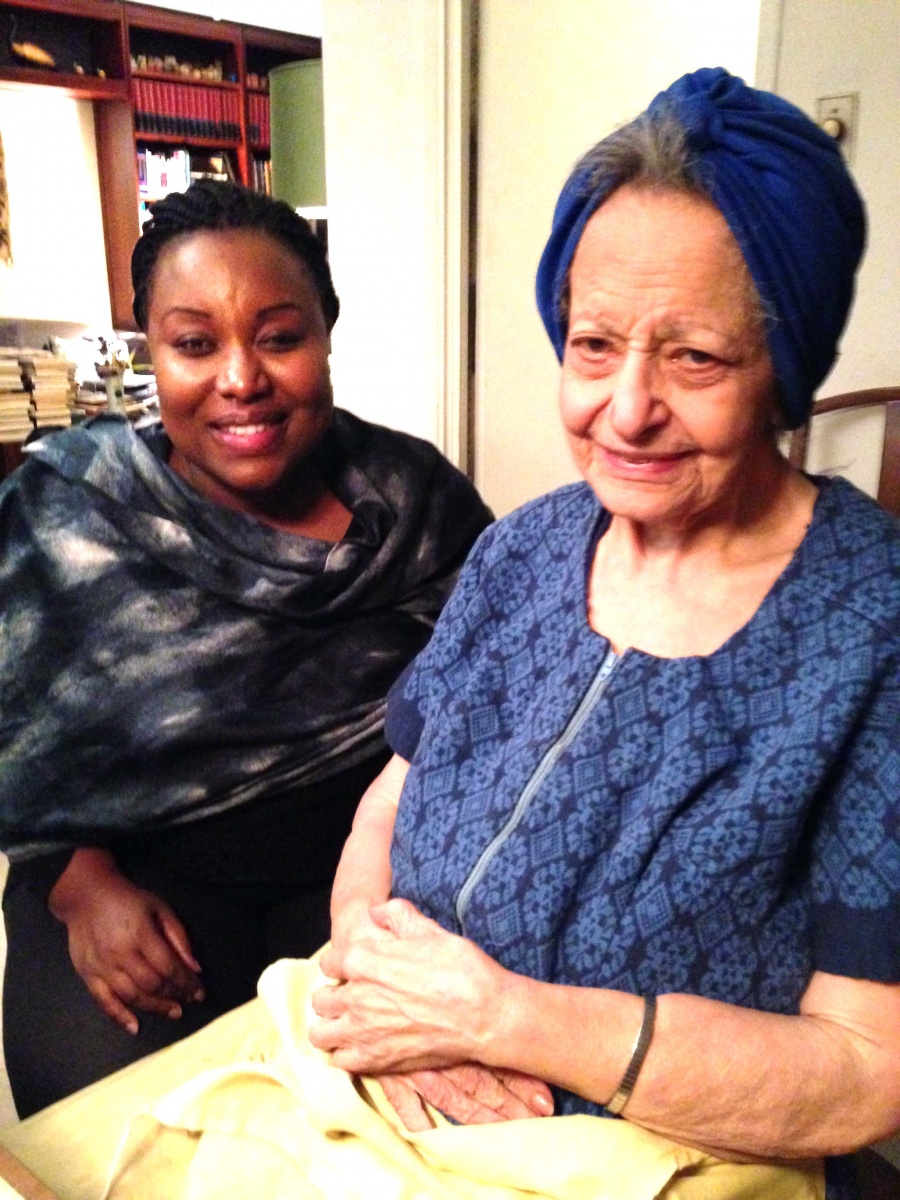 I first met Leila in 2005 at the IAWRT Biennial in Virginia. But the first time I stayed at her house was in 2012 with Abeer Saady, then a new member of IAWRT, and it became the start of a great friendship. I visited her every year after that but came full circle when both Abeer and I visited her together again just three months ago.
I first met Leila in 2005 at the IAWRT Biennial in Virginia. But the first time I stayed at her house was in 2012 with Abeer Saady, then a new member of IAWRT, and it became the start of a great friendship. I visited her every year after that but came full circle when both Abeer and I visited her together again just three months ago.
We were amazed at how brave she was to come out to the IAWRT parallel event, followed by a lengthy meeting between the International Board and the local chapter, even though she was in a lot of pain. Later the three of us went out to her favourite Japanese eatery, the Fatty Fish near her Manhattan Apartment.
In the restaurant some guests who sat next to us, overheard our conversation and ended up having a huge debate with Leila about the Middle East and US policy. Abeer and I listened with intrigue and awe as Leila sparred with these people. Little did we know this was the last time we would see her.
Leila always told me she will sleep when in the grave every time I annoyed her about resting. Leila my dear you are free at last and no longer in pain.
Going to New York will no longer be the same without you. l will miss the conversations and miss you dearly. Deepest condolences to the loved ones she left behind. May her soul rest in eternal peace.
Awaz Saleem Abdalla: I will never forget her kindness
I will never forget how Leila was so nice to us three women journalists; myself from Kirkuk, Muna Muhsen from Baghdad and Sahr Hussein Ali al-Haydari from Mosul, when the Institute for War and Peace reporting (IWPR) took us to the US in 2005.
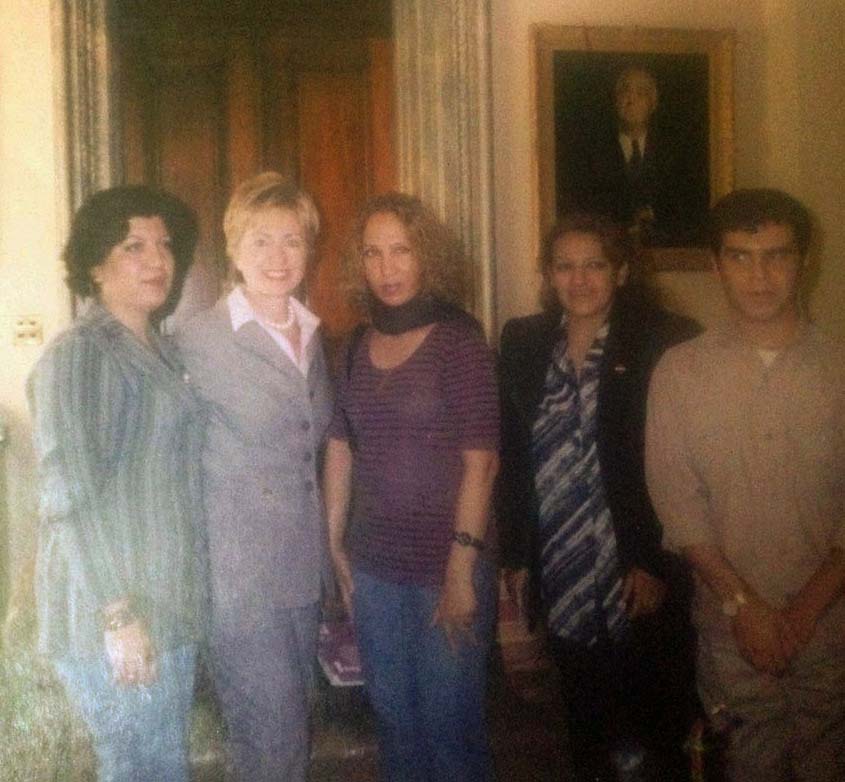 We met with Hillary Clinton, but my friend Sahar (Sahar) was scared of an arrangement to meet the President, George W. Bush, and said she would get killed in Mosul if they knew she had met with the man who had ordered the invasion of Iraq. Unfortunately, later she was killed anyway, when she was confronted by gunmen from the Ansar al-Sunna extremist group.
We met with Hillary Clinton, but my friend Sahar (Sahar) was scared of an arrangement to meet the President, George W. Bush, and said she would get killed in Mosul if they knew she had met with the man who had ordered the invasion of Iraq. Unfortunately, later she was killed anyway, when she was confronted by gunmen from the Ansar al-Sunna extremist group.
Muna Muhsen and I were threatened with death so we left the city and never returned. Muna Muhsen had been a TV presenter in Baghdad.
The trip to the United States was our first travel outside Iraq and our first time flying in a plane. The former Iraqi President, Saddam Hussein had prevented us from travelling prior to this.
Everything was strange to us. We believed that we should get treated as guests and live a royal life in the US, it was a big event for us. Instead of thanking IWPR, we blamed them for not showing us much other than radio stations, and putting us in danger.
IWPR were worried about our attitude, but Laila understood what we were saying. She knew that on our first visit, we wanted to see what life in the US looked like.
Laila helped us a lot, called us every day and made us delicious food.
Nonee Walsh was impressed by Leila’s intervention of behalf of the Iraqi journalists
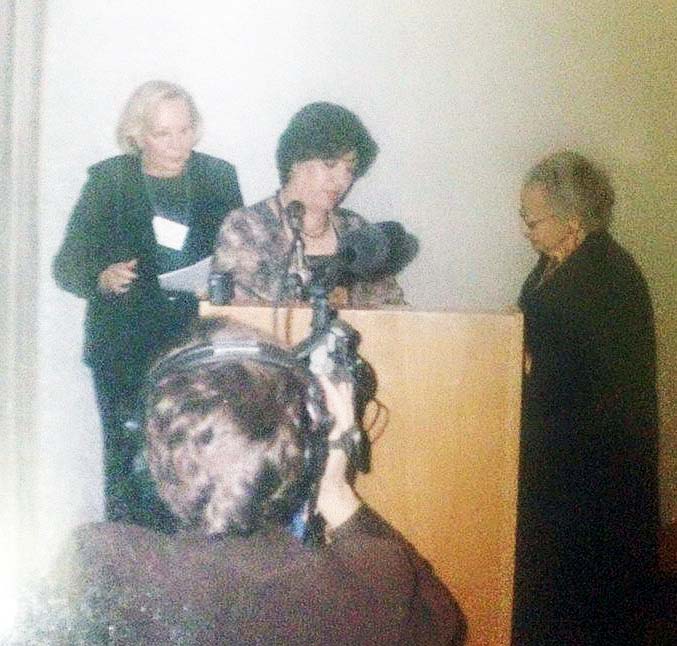 In the wake of the 2003 invasion of Iraq, several Iraqi women broadcasters were being hosted in the US by a commercial radio broadcasting training project. Much to the annoyance of the IAWRT members, their US host kept talking, telling us how the women were learning about talk-back radio, and paraphrasing how they suffered with the destruction of Iraq’s infrastructure.
In the wake of the 2003 invasion of Iraq, several Iraqi women broadcasters were being hosted in the US by a commercial radio broadcasting training project. Much to the annoyance of the IAWRT members, their US host kept talking, telling us how the women were learning about talk-back radio, and paraphrasing how they suffered with the destruction of Iraq’s infrastructure.
The audience became increasingly annoyed as the murmurs “let them speak” became more audible; but the host insisted the womens’ English was not good enough. Then I saw this small woman in her eighties, who I didn’t know, rise and made her way to the microphone. “What could you tell them about radio?” she asked, “Iraq along with Egyptian broadcasting, where I was a manager, are the oldest and the best broadcasters in the Middle East.” If my memory is correct, Leila might have conceded that Iraqi broadcasting was even better than Egypt’s!
“I can translate” she said, and Lelia took over, gently interviewing the three journalists, Awaz, Sahar and Muna, about their experiences in Iraq, and the threat to, or destruction, of their careers as broadcasters. Later some of those women joined IAWRT. pic right: Lelia ready to translate for Awaa.
I introduced myself to Leila after the session, thanking her for her intervention, as I was getting angry but didn’t know what to do. She said she was annoyed at how poorly the women were being hosted, and was arranging a UN visit for them. She also generously invited me to stay with her in New York, if I ever visited. It is a treasured memory of a strong and gracious woman, and I am saddened that I will not see her again in this world.
Gerd Inger Polden: I was instantly taken in by her fearlessness, her vitality and her warm concern for others
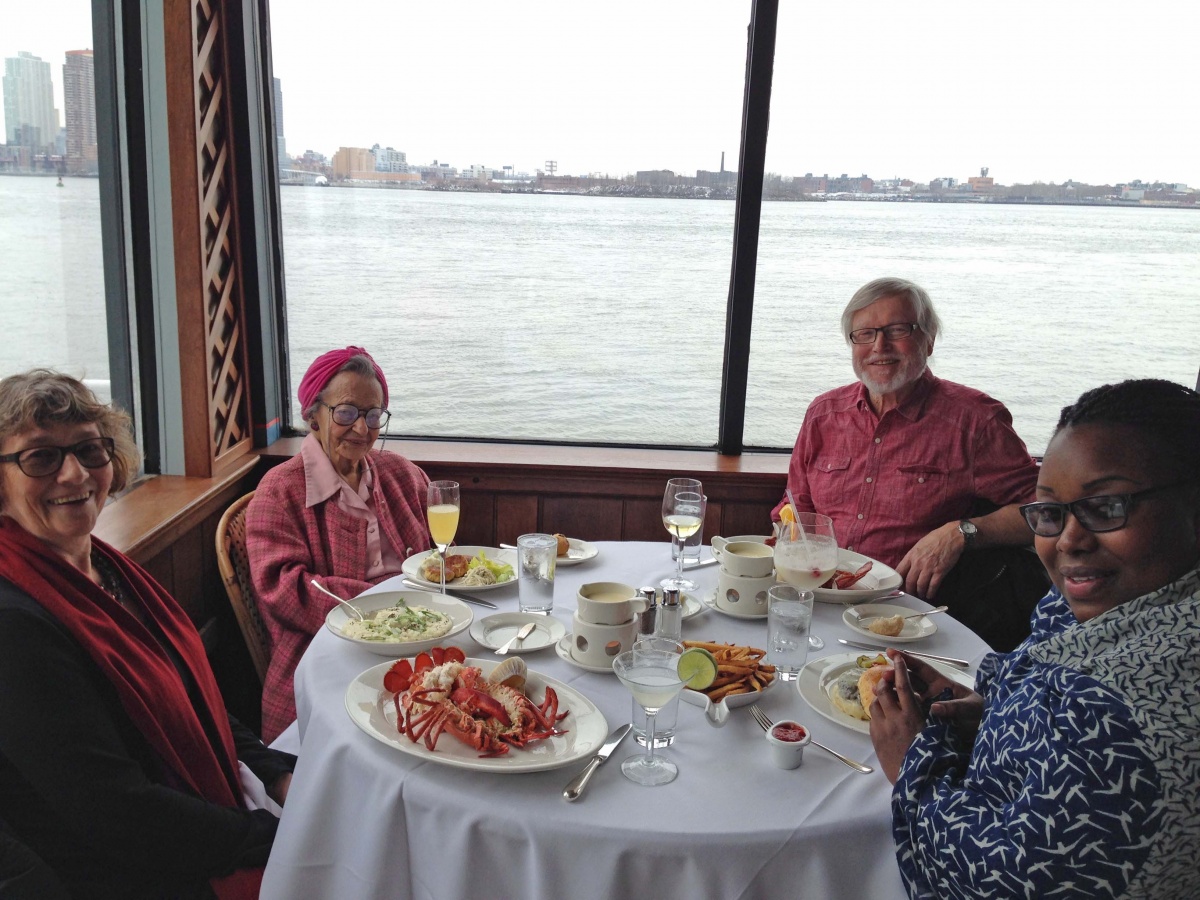 Gerd Inger Polden writes that she and Leila developed a close friendship after meeting in 2005; I was instantly taken in by her fearlessness, her vitality and her warm concern for others. She discovered that the two Iraqi journalists were to be presented by their hosts at a press conference back in Washington DC. They were rightly afraid that the media coverage might endanger their lives once they were back in Iraq. Leila and I spent most of the night talking to them and planning how to stop their hosts from doing this. The next day Leila presented their plan at our conference, and an outcry from IAWRT members forced their hosts to cancel the press conference.
Gerd Inger Polden writes that she and Leila developed a close friendship after meeting in 2005; I was instantly taken in by her fearlessness, her vitality and her warm concern for others. She discovered that the two Iraqi journalists were to be presented by their hosts at a press conference back in Washington DC. They were rightly afraid that the media coverage might endanger their lives once they were back in Iraq. Leila and I spent most of the night talking to them and planning how to stop their hosts from doing this. The next day Leila presented their plan at our conference, and an outcry from IAWRT members forced their hosts to cancel the press conference.
Speaking out against power has been her trademark. When we stayed with her during the 2015 CSW in New York she told us about her time as Assistant Secretary General for personnel services, towards the end of her long UN career.
She did not want the position, but she was persuaded to take it. It was hard. She wanted to hire the best qualified people, but often the political pressure was on hiring someone from a nation that was next in line to get a position. Finally, when she was ordered to hire a person she deemed not qualified, she went to the Secretary General and said: “I am too old to be a prostitute, I resign.” And she did. Pic right: Gerd Inger Polden, Leila Doss, Ulf Arnesen, Violet Gonda New York 2015
Night after night we listened to her tell stories from her childhood in Assiut in Upper Egypt as well as from her long life at the UN. Dag Hammarskjöld was her favourite as Secretary General, and she mourned him and kept a lifelong close friendship with his nephew and his family.
Her apartment in New York is covered with owls in all shapes and forms. The first one was given her by a close friend. When she asked why, he said, you are an owl. From then on, so many friends gave her owls which find their place in the packed bookshelves and everywhere else.
Her analytical mind and her memory was as sharp as ever, and she remembered the old days as well as kept herself updated on the current news, culture, books, and magazines. And last, but not least, she was a wonderful cook, and a wonderful friend.
When I phoned her and congratulated her on her 95th birthday on June 17th less than a month ago, she still had that special warmth and eagerness in her voice that always made me feel happy and loved. Finally, please enjoy and recognize the sharp witted and outspoken Leila we all know, speaking out against western prejudices in this article in the Pittsburg Post-Gazette from July 26 1947. At the end of this visit in the US, she walked into the UN and said: “I want to work in the UN.”
In Leila’s own words
In 2005, Freida Werden (IAWRT President 2005-7) recorded Leila Doss speaking at the IAWRT Biennial. Some of this tribute is sourced from the WINGS program, scripted, edited and hosted by Emily Falk, which can be heard here.
Please contact [email protected] if you wish to add a personal note.
|
Egyptian born Geneva based novelist, researcher, and PEN representative to UNHCR, Fawzia Assad I am devastated by the news. Leila was the model of our generation, an example of woman power. She never stopped building bridges, advising, helping, giving. Deeply Egyptian and convinced International, American and European. And Genevoise, she spent summers in Geneva, New York was her home, but Geneva was her other home, and Cairo, and Assiut. She had a large space in her heart to take it all. My condolences to her family. |
|---|

